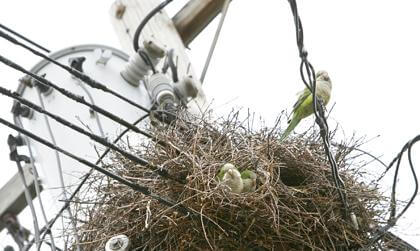By Stephen Stirling
Parrots 2, Con Ed 0.
Queens’ electrical utility is losing the battle to the wild parrots that roost on overhead wires in Whitestone and briefly knocked out power to more than 1,500 customers in Beechhurst Monday evening.
The resourceful birds even outsmarted a battery−operated owl, installed by Con Edison, which was supposed to keep them at bay but ran out of juice on its own.
Hundreds of monk or Quaker parrots have been building colonies in Whitestone and parts of Brooklyn for more than 30 years, and Con Ed spokesman Chris Olert said the utility has had to spend tens of thousand of dollars as a result.
Olert said the bright green parrots build their massive nests around transformers on top of utility poles, which can cause the transformers to overheat, occasionally causing fires or explosions that lead to localized blackouts.
One such nest is being blamed for a transformer explosion in Beechhurst Monday afternoon that knocked out power to about 1,500 households for 45 minutes on Monday.
“This was not the first time that it’s happened,” Olert said. “These are not endangered species — they’re very hearty — so it’s an ongoing issue for us.”
Olert said the subsequent repairs can cost upwards of $20,000. The annoyance has gotten so bad in recent years that the utility even tried a rather unorthodox method of staving them off: a small, battery−operated owl affectionately dubbed “Hootie.”
“That was an experiment, yes,” Olert said. “We’re always looking for ways to keep the equipment safe. We’ve got to keep it safe not just for our workers, but for the public as well. God forbid someone’s car or someone is walking underneath one of these things when they go up.”
Though “Hootie” was reasonably effective, he was recently retired from service after being damaged in a transformer fire. Workers believe the bird’s batteries may have died, leading the parrots to figure out Con Ed’s ploy and build a nest around the nearby transformer.
Though monk parrots are indigenous to South America, they have made their homes in Brooklyn and Queens for decades. There is no definitive answer on how the birds got to the city, but prevailing wisdom among ornithologists says that a shipment of the parrots bound for a local pet store in 1967 or 1968 got loose after arriving at John F. Kennedy International Airport and the birds have made their homes in the surrounding communities ever since.
Pat Carpentiere, president of the Whitestone Taxpayers Civic Association, was surprised to hear that the parrots had caused the blackout he experienced at the Whitestone Armory Monday. He said his group is more than aware of the parrots, but the birds have never spurred a call to action.
“The biggest complaint is that they make a racket in the morning,” Carpentiere said. “Down the road, I can see it becoming a problem. But put it this way: Right now, parrots are, like, number eight out of 10 on our list of problems.”
Reach reporter Stephen Stirling by e−mail at sstirling@cnglocal.com or by phone at 718−229−0300, Ext. 138.































